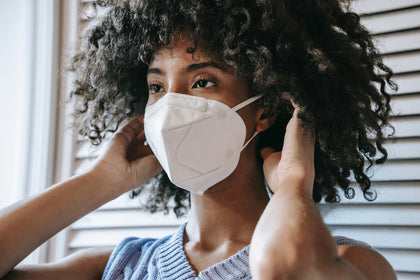Coming down with an infection is never ideal, and sometimes infections can strike at the scalp. When they do, and if they persist, you might start to suspect there's a chance that they might interfere with your hair growth, causing thinning or hair loss.
Stop wondering! Read on to learn more about the connection between infections and hair loss. Plus, discover preventative measures to take and what clean, natural products you should start using to help combat thinning hair.
Fact or Fiction: Do Infections Cause Hair Loss?
In some cases, certain types of infections occurring on the skin might have the potential to do the following:
- Impact the hair follicles necessary for healthy hair growth cycles.
- Hinder hair regrowth if the scalp is inflamed or irritated.
- Result in hair thinning, breakage, damage or some degree of hair loss.
How Infections Impact Your Skin, Scalp and Hair
Your scalp is an extension of your skin. Thus, any skin condition that alters the scalp, such as a fungal infection, might also play a role in hair loss issues.
"Scalp infection can also cause hair loss on the scalp area, especially if [it] causes scarring," said board-certified dermatologist and dermatopathologist Dr. Gary Goldenberg of Goldenberg Dermatology.
Of course, having a skin condition or infection doesn't automatically mean you're going to experience permanent hair loss. Temporary hair loss can occur for numerous reasons, including stress, poor nutrition such as iron deficiency, an underlying medical condition, chemotherapy drugs and fluctuations in hormone levels or hormonal imbalances.
Related: Scalp Inflammation and Hair Loss: Is There a Connection?
Identifying Infections: What to Look For
Symptoms of scalp infections, fungal infections or bacterial infections can present themselves in various ways. According to science, many fungal infections of the skin, including that on your scalp, are caused by a yeast fungus species known as Candida albicans. However, there are other infections that can interfere with healthy hair follicles necessary for hair growth.
Learning to identify the signs of an infection is your first step in regulating, correcting and, ultimately, finding the right treatment options. Here, find examples of what to look for:
- Tinea capitis: Also known as scalp ringworm, tinea capitis results in a rash caused by a fungal infection. Tinea capitis is contagious and most commonly found in school-age children. It can cause scarring and permanent hair loss.
-
Folliculitis: While there are non-infectious forms of folliculitis, it's a common result of Staphylococcus aureus, one of the bacterial infections that cause hair loss. Folliculitis appears similar to acne or razor bumps with small rings of inflamed skin surrounding the opening of the hair follicles, after which the hair may fall out. If severe, it can potentially permanently destroy the hair follicles in the affected area, including the scalp, facial and pubic hairs.
"Any time there's an opening or break in the skin, bacteria can get in," said Dr. Erin Kil, M.D., board-certified dermatologist and founder of New Bloom Dermatology. "Treatment of the inflammation may help decrease the hair loss." - Piedra: Black piedra, also known as Trichomycosis nodosa or white piedra, are fungal infections that refer to the color of the node formed on the hair fiber. Trichosporon beigelii, white piedra, is found mostly in Europe and Southern parts of the United States. Piedraia hortae, black piedra, is found mainly in tropical areas and predominantly affects scalp hair, although it can also impact beard, mustache and pubic hairs. If this fungal infection is severe enough, it can weaken hair fibers, which can result in breakage and hair loss.
Read: What You Need to Know About Scalp Yeast Infections
Other Complications That Could Cause Hair Loss
Anytime you notice changes in your hair or scalp, it's an indicator that something needs to shift. Keep a watchful eye out for other types of hair loss that can be associated with infections, including the following:
Alopecia Areata
Autoimmune diseases, such as this condition, occur when the hair follicles are attacked by the immune system, resulting in patchy hair loss. Alopecia areata can also result from an infection such as COVID-19. An autoimmune disease, such as systemic lupus erythematosus or thyroid problems, can also potentially lead to hair loss.
Alopecia Totalis
This is a condition characterized by the complete loss of hair on the scalp. It is an advanced form of alopecia areata, which causes round patchy hair loss.
Seborrheic Dermatitis
"Malassezia furfur are the normal flora yeast scalp fungus that reside on everyone’s scalp and other hair-bearing areas,” said Dr. Audrey Kunin, board-certified dermatologist and founder and chief creative officer of DERMAdoctor. “Overgrowth or sensitivity to their presence can drive scaling, itching and redness. The result is seborrheic dermatitis.”
Caused by an overgrowth of a type of yeast called Malassezia, seborrheic dermatitis is an inflammatory condition that creates red, itchy skin and scales that shed on the outer layers of skin and/or the scalp. Seborrheic dermatitis is the same condition as what is called "cradle cap" on an infant. It can be related to hereditary hair loss [and] atopic dermatitis and become aggravated by cold weather. While not a direct symptom of seborrheic dermatitis, scabs may also develop if you scratch intensely and break the skin of the scalp. And, anytime the skin is broken, viruses and bacteria have the chance to enter, which could lead to hair loss.
"Seborrheic dermatitis is a form of eczema on the scalp," explained Dr. Kil. " A prescription anti-fungal medicated shampoo and topical steroid to reduce the inflammation may benefit those individuals with this condition."
Read: What You Should Know About Seborrheic Dermatitis and Hair Loss
Here's What to Do
Follow these ideas on how to prevent infections or other issues from taking control over your body, including your scalp and hair.
De-Stress
As you likely know, stress is another key factor in how both our emotional and physical bodies function. Stress can trigger a host of unwanted symptoms, including a temporary hair loss condition known as telogen effluvium.
"Infections can certainly cause telogen effluvium — a type of hair loss. The patient will usually experience shedding of hair on their scalp three to six months after the infection," said Dr. Goldenberg. "This type of hair loss is usually temporary. But, it can unmask an underlying androgenetic alopecia hair loss (male or female pattern hair loss)."
There is good news: Once the stressor has resolved, hair loss related to TE usually also resolves itself.
Completely resolving external stressors might not always be possible, but you can help manage internal stress. Turn your self-care routine into relaxation rituals that focus on taking care of yourself from the inside out. Minimize stress with mindful practices such as meditation and yoga.
Read: What is Telogen Effluvium? One Type of Hair Loss Explained
Know When to See a Doctor
While temporary hair loss or telogen effluvium can be triggered by an infection, such as COVID-19, and will typically resolve itself, some infections need to be addressed by a doctor.
“An infection on the scalp can damage hair follicles and result in hair loss if left untreated," said Dr. Dennis Gross, board-certified dermatologist and dermatologic surgeon. "The yeast can also spread beyond the scalp into your eyes, mouth and bloodstream — this causes serious illness."
Any sort of unexplained, sudden hair loss or excessive hair loss should prompt a visit to your doctor. Leaving scalp fungal infection or other infections untreated can potentially lead to a range of uncomfortable symptoms, unwanted issues, damage, thinning or hair loss.
Holistic Hair & Scalp Wellness Begins Within
Maximize your overall wellness by boosting immunity and balancing from within. Lead a healthy lifestyle that includes a nutrient-rich diet along with supplements, stay hydrated, make movement and regular exercise a daily habit and regulate your stress levels.
Taking a holistic approach will help you maintain optimal immunity to stave off future infections, keeping your body, mind, scalp and hair strong, healthy and looking their very best!
MORE From VEGAMOUR
- Shop: The Best Products for Hair Wellness
- Experience Itchy Scalp and Hair Loss? Read This
- 6 Whole Body Probiotic Benefits
- Why Does Chemotherapy Cause Hair Loss?
Photo credit: Sora Shimazaki/Pexels
Back


















